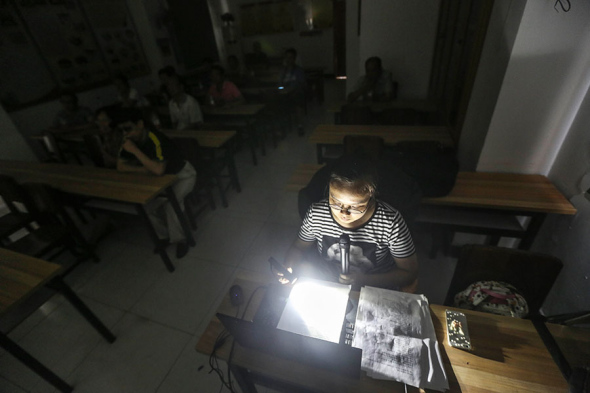
Du Chengcheng recounts the plot of a movie at the "cinema for the blind" in Wuhan, Hubei province. (Pu Xiaoxu/For China Daily)
In a community theater, Du Chengcheng carefully recounts the plot of Lost on Journey, a popular 2010 comedy movie about a successful businessman and a migrant worker who travel home for Chinese New Year.
Instead of showing the film on the big screen, she tells the story verbally to an audience of visually impaired people.
Du, 32, is a volunteer for the disabled in Wuhan, Hubei province. She started presenting movies to the blind in 2010, when the local disabled people's federation built a "cinema for the blind" in Jiangjiadun residential community. "When I see visually impaired people laugh or cry because of the stories I tell them, I feel very emotional," she said.
In December, Zeng Maojun, president of Wanda Pictures, said Chinese films have been enjoying rapid growth of more than 30 percent a year, particularly in major cities such as Beijing and Shanghai.
According to the State Administration of Press, Publication, Radio, Film and Television, the country's box-office revenue rose 13 percent to 55.9 billion yuan ($8.7 billion), with domestic films contributing 53 percent last year.
As of the end of last year, China had over 44,000 movie screens, slightly more than North America.
But it is a challenge for blind people to fully enjoy movies, so Du tries to explain the plots as vividly as possible.
"When I first joined the cinema, I did not know what to do," she said. "So I just closed my eyes and imagined what I would want to hear if I were blind."
Du knows which parts of the plots to emphasize, and how to keep the audience engaged. "Sometimes the script for a 1-minute scene can take more than an hour to write," she said.
To make the story more engaging, Du said she often watches a film more than 20 times.
China has more than 85 million disabled people, and the number is expected to exceed 160 million by 2050, according to a 2013 forecast from the China Disabled Persons' Federation. Of the disabled, about 6 million are visually impaired.
China has been striving to improve the lives of the visually impaired, from medical treatment and targeted employment to enriching lives through culture.
Du is disabled, too. Born with congenital neurofibroma, which causes tumors along the nervous system, she was unable to run as freely as her peers. In 2009, one of Du's legs had to be amputated.
She did not resign herself to hopelessness and depression. Instead, she poured her heart into charity work and over the past eight years has brought "film experiences" to more than 7,000 visually impaired people.
Du has also trained more than 100 volunteers to do what she does.
"My visually impaired friends often tell me that they are willing to be my leg, and I just tell them that I am their eyes," she said. "I hope my film-telling can be a light, guiding them in this beautiful world."


















































